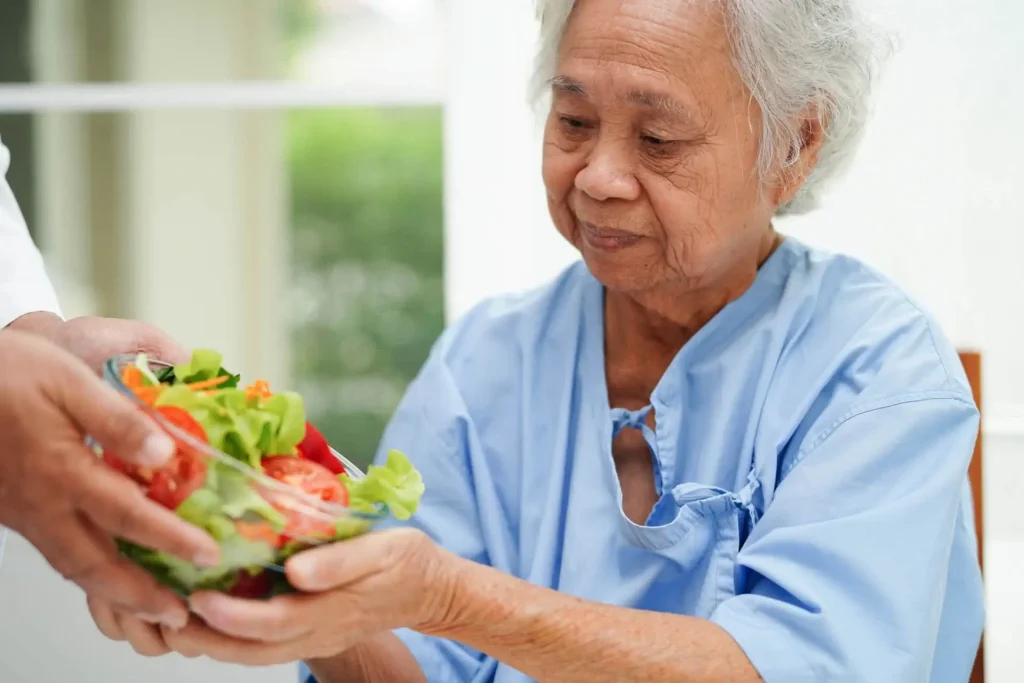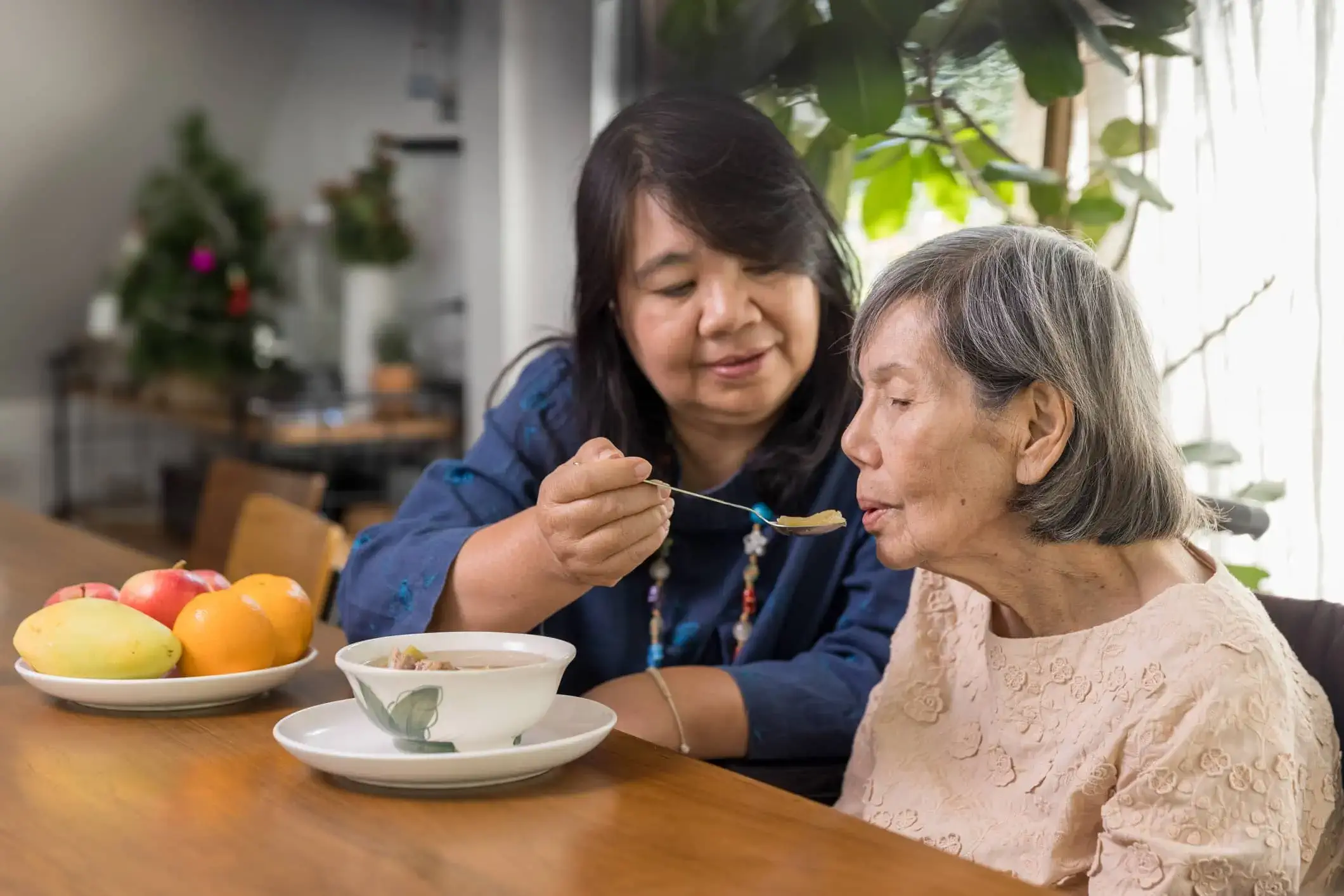
Complications of Nutrient Deficiencies in the Elderly
As we age, proper nutrition and attention to nutrient deficiencies in the elderly are especially important to maintain a healthy body and mind; as we age, although we need to consume fewer calories, we need more vitamins and minerals. In this regard, several factors can cause nutrient deficiencies. Some people have financial problems or consume less food due to physical problems, depression, loss of appetite, forgetfulness, etc. Some diseases and the use of certain medications increase the nutritional needs of older people because the body’s ability to absorb nutrients decreases.
When the balance between the nutrients needed by the body and its intake through food is disrupted, malnutrition occurs. Malnutrition in the elderly may be due to a lack of calories or it may be due to a lack of protein, vitamins or minerals. Although malnutrition is harmful at any age, older adults are more likely to develop serious complications due to slower recovery and the presence of underlying diseases. Malnutrition in older adults can be caused by factors such as loss of appetite, inability to chew and swallow food, and medication side effects. In this Human Health Mag article, we will discuss some solutions to the problem of nutrient deficiencies in older adults.
How Does Aging Affect Your Nutritional Needs?
Aging is associated with many changes, including muscle loss, thinning skin, and decreased stomach acid. Some of these changes can make you more susceptible to nutrient deficiencies in the old age, while others can affect how you feel and your quality of life. Therefore, it is important to create a daily meal plan for the elderly that covers the nutritional needs of older adults.
For example, studies have estimated that 20% of older adults have gastritis, a condition that damages the cells that produce stomach acid. Reduced stomach acid can affect the absorption of nutrients such as B12, calcium, iron, and magnesium. Another challenge of aging is reduced calorie needs. Unfortunately, this is a major challenge for these individuals. Older adults need to get more of some nutrients while simultaneously limiting their calorie intake. For this problem, one way is to get all the food groups completely and take a nutritional supplement to meet the need for nutrients along with the diet.
Another problem that people experience as they age is a decrease in the ability to identify vital sensations such as hunger and thirst. This can make people susceptible to dehydration or involuntary weight loss. These problems in not recognizing the feeling of hunger and thirst become more severe with increasing age and can lead to various diseases for people. As a result, awareness of the relationship between elderly nutrition and diseases will help you set a nutritious diet plan for your elderly.

Reduced Calorie Needs and Increased Nutrient Needs
Nutrient deficiencies in the elderly and calorie needs in people depend on height, weight, activity levels, muscle mass and other factors. Elderly people need fewer calories due to less physical activity and less muscle mass. If they continue to consume calories at the same rate as they did in their youth, they may gain weight, especially in the abdominal area. This is more common in women of menopausal age, and in this group, increased fat accumulation is observed in the abdominal area as estrogen levels decrease during menopause. If you know how many calories does an elderly bedridden person need, you can include this substance in your elderly loved ones’ diet.
However, in the elderly, as calorie needs decrease, the need for some nutrients increases more than in other people. This shows the importance of getting a variety of foods such as fruits, vegetables, fish and lean meat. A varied and balanced diet can help combat common nutrient deficiencies without increasing body fat. Important nutrients as we age include protein, vitamin D, calcium, and vitamin B12.
How to Treat Nutrient Deficiencies in the Elderly
By eating nutritious meals and getting vitamins, you can compensate for nutrient deficiencies in the elderly. Here are the most important nutrients for the elderly.
- Get more protein: Muscle loss and muscle strength are one of the most common problems that occur with age. In fact, adults lose 3-8% of their muscle mass for every decade of aging after the age of thirty. Muscle loss is one of the factors that contribute to physical weakness, fractures, and various diseases in adulthood. Getting more protein can help preserve muscle in these people. It is recommended that people use a high protein soft foods for elderly along with strength exercises to prevent weakness and muscle loss.
- Increase fiber intake: Constipation is a common health problem in the elderly. Constipation is very common in people over 65 years of age and is two to three times more common in elderly women than in men. This is due to reduced mobility in this age group and also to the use of medications that cause constipation. Consuming fiber can help improve constipation. Fiber passes through the digestive tract undigested and helps form stools and regular bowel movements. Consuming fiber can also be helpful for people with bowel diseases.
- Calcium and vitamin D intake: Calcium and vitamin D are two important nutrients for bone health. Calcium helps build and maintain healthy bones, and vitamin D helps the body absorb calcium. Older people often absorb less calcium from their diet. This is because the digestive tract is less able to absorb calcium as they age. On the other hand, vitamin D deficiency can also reduce calcium absorption. Given all of these conditions, the need for calcium and vitamin D through diet and supplements increases with age. Various foods such as dairy products and green leafy vegetables contain calcium. Various foods such as fish also contain vitamin D.
- Vitamin B12 intake: Vitamin B12 is a water-soluble vitamin that is essential for the production of red blood cells and maintaining proper brain function. Studies have shown that 10-30% of people over the age of 50 have a reduced ability to absorb vitamin B12 from their diet. Vitamin B12 is found in the proteins in the food people eat, and stomach acid helps to release it from the proteins they eat.
Other Nutrients That Can Help Your Health as You Age
Other nutrients that can help with nutrient deficiencies in the elderly include:
- Potassium: Higher potassium intake has been linked to a lower risk of high blood pressure, kidney stones, osteoporosis, and heart disease, all of which are more common among older adults.
- Omega-3 fatty acids: Heart disease is one of the leading causes of death among older adults. Studies have shown that omega-3 fatty acids can reduce the risk of heart disease and lower blood pressure and triglycerides.
- Magnesium: Older adults are at risk for deficiencies in this mineral. Reasons for deficiencies include poor diet, medications, and age-related changes in the digestive system.
- Iron: Deficiencies in this nutrient are common in older adults. This deficiency can lead to anemia, which can prevent the body from getting enough oxygen for proper breathing.
Many of these nutrients can be obtained from a well-balanced diet that includes adequate amounts of fruits, vegetables, fish, and lean meats.

Most Common Complications of Nutrient Deficiencies in the Elderly
The elderly are more susceptible to malnutrition and the risks associated with it due to age-related physiological changes. Some of the complications of nutrient deficiencies in the elderly include:
Weakened immune system
- The lack of micronutrients in the body greatly reduces the strength of the immune system, and this destructive process will make the elderly susceptible to various infectious diseases.
The emergence of digestive defects
- Reduced absorption of nutrients in the elderly causes the intestinal wall to thicken and the absorption capacity to be lost. These problems are associated with the occurrence of serious diseases such as Parkinson’s.
Muscle weakness
- Lack of nutrients and protein in the diet of the elderly leads to muscle weakness. This deficiency increases the risk of falls and bone fractures.
Mental problems
- Lack of proper nutrition and nutrient deficiencies have a detrimental effect on brain power and nervous system function, and in the long term, are associated with problems such as memory loss, impaired concentration, and the risk of Alzheimer’s.
Measuring Vitamins and Nutrients Needed by the Elderly
If you don’t want your parents to suffer from nutrient deficiencies in the elderly, you should include the vitamins and nutrients they need in their meals according to their body’s needs. Vitamins and minerals are measured in different ways. The most common ones are:
- mg milligrams (one milligram is equal to one thousandth of a gram)
- mcg micrograms (one microgram is equal to one millionth of a gram. 1000 micrograms is equal to one milligram)
- IU international units (converting milligrams and micrograms to international units depends on the type of vitamin or medication)

5 Reasons to Compensate for Nutrient Deficiencies in the Elderly
A healthy and balanced diet can help increase the energy of the elderly, prevent diseases, eliminate nutrient deficiencies in the elderly, strengthen the immune system, and improve mental and physical performance. The most important reasons why the elderly should pay more attention to their nutrition include the following:
1- Strengthening the immune system and fighting diseases
- As we age, the immune system weakens, and the elderly body becomes more vulnerable to infections and diseases. Eating foods rich in vitamin C, vitamin D, and antioxidants, such as citrus fruits, green leafy vegetables, and fatty fish, helps improve the body’s immunity.
2- Maintaining healthy bones and preventing fractures
- Osteoporosis and reduced bone density are common problems in the elderly. A diet rich in calcium and vitamin D (such as low-fat milk, yogurt, almonds, and salmon) helps maintain healthy bones and prevent fractures.
3- Heart care and reducing the risk of heart disease
- High blood pressure and high cholesterol are common problems in the elderly. Consuming low-salt and low-fat foods such as olive oil, fish, legumes and vegetables can promote heart health and reduce the risk of heart disease.
4- Preventing digestive problems and constipation
- As people age, digestion slows down in the elderly and problems such as constipation become more common. Consuming enough fiber through whole grain bread, legumes, vegetables and fruits improves bowel function and prevents constipation.
5- Preventing vitamin deficiencies in the elderly and physical weakness
- The elderly are more prone to deficiencies in essential vitamins such as B12, D and iron, which can cause fatigue, weakness and memory loss. Including nutritious foods for the elderly such as white meat, fish, eggs and low-fat dairy products in the diet compensates for these deficiencies.
Concluding Remarks
Aging is associated with changes that make you susceptible to nutrient deficiencies in the elderly, such as calcium, vitamin D, B12, iron, magnesium, and other nutrients. The ability of people to identify feelings of hunger and thirst also decreases at this age. It is recommended that seniors consider various things to improve these conditions. Also, make conscious efforts to include a variety of foods and drinks in their daily routine, along with taking the necessary supplements.
Thank you for following this article so far. If you also have information or experience in this field, you can share it with us and other users.

Frequently Asked Questions
What Foods Should Seniors Eat More of?
Foods rich in protein, calcium, fiber, omega-3, and vitamins B12, D, and C, such as fish, low-fat dairy products, vegetables, olive oil, and eggs, are beneficial for seniors.
What Diet is Recommended for Seniors?
Small but nutritious meals, low in salt and fat, rich in fiber and protein, avoiding artificial sugars, and drinking enough fluids are the principles of healthy nutrition for seniors.
How to Prepare a Balanced Diet for Seniors?
A senior diet can be created by combining protein, fiber, vitamins, and healthy fats in 5-6 small meals a day and varying foods.
Is it Necessary for Seniors to Take Nutritional Supplements?
In some cases, such as vitamin D deficiency, calcium and B12 are necessary, but they should be taken under the supervision of a doctor.
